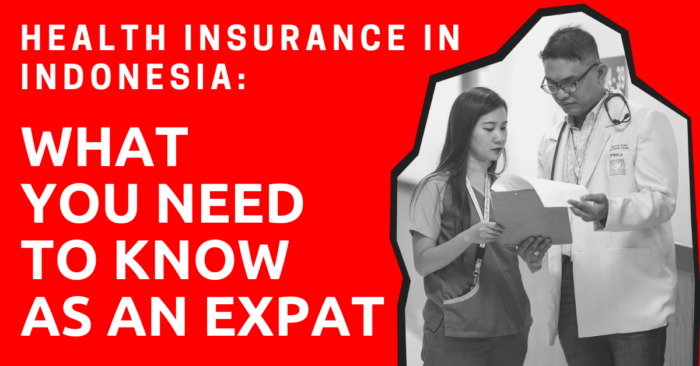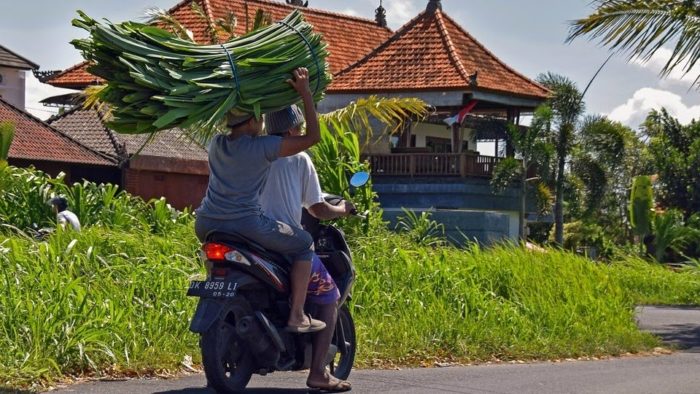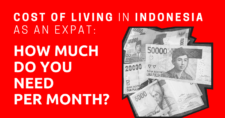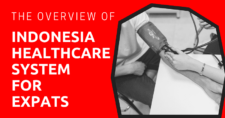
There are many health insurance options available for expats in Indonesia, ranging from international health insurance to national health insurance.
Each option comes with its own pros and cons.
For example, expat health insurance can be the most comprehensive but also the most expensive option. On the other hand, BPJS, the Indonesian universal healthcare system, is much more affordable. However, it’s not available to everyone.
Also, there’s concern over the quality of treatment and wait times.
In this guide, you can find out everything you need to know about health insurance for expats in Indonesia.
We list the various insurance options, including their pros, cons, coverage, exclusions, and application procedures.
This article will take approximately 22 minutes to read. Don't have the time right now? No worries. You can email the ad-free version of the article to yourself and read it later!
Disclaimer: This article may include links to products or services offered by ExpatDen’s partners, which give us commissions when you click on them. Although this may influence how they appear in the text, we only recommend solutions that we would use in your situation. Read more in our Advertising Disclosure.
Contents
Key Takeaways
- Expat health insurance is the most popular option because it’s comprehensive, easy to understand, and you can take it with you when moving to a new country.
- Local health insurance usually comes as an add-on to life insurance plans. Local plans are also hard to get unless you speak Bahasa Indonesia.
- Indonesia has universal health coverage called BPJS. It’s basically social security that is available to expats who work legally in Indonesia.
- You can also check out our expat health insurance comparison tool to find out popular health insurance options in Indonesia for expats.
Do Expats Need Health Insurance in Indonesia?
Healthcare in Indonesia is cheap. Even private international hospitals only cost you about US$55 for a doctor visit. Because you can pay out of pocket, you might wonder why you even need health insurance.
However, there are four reasons why you should get health insurance in Indonesia:
- Guaranteed treatment
- Full payment for expensive treatments
- More access to Indonesia’s healthcare system
- Access to better facilities in nearby countries
Here are some more details on each reason.
First, having health insurance guarantees you get treatment. Without insurance, hospitals might deny you care because they get overcrowded and lack doctors. In fact, the ratio of doctors to patients in Indonesia is seven to 10,000. The World Health Organization recommends six doctors for every 3,600 patients.
Hospitals want to make sure you can pay for medical care before admitting you. Having health insurance is a good way to make sure that happens.
Second, while general medical expenses in Indonesia are quite cheap, costs can quickly escalate for more serious health issues.
For example, one unlucky Australian expat needed to pay AUD50,000 (US$34,000) to a hospital in Bali after having cardiac arrest. The hospital demanded full payment before releasing him. In addition, he needed to pay another AUD45,000 to get sent home via medevac.
Third, health insurance lets you access Indonesia’s healthcare system. This could be challenging because good hospitals can be hard to find. Health insurance companies can normally recommend to you a hospital in Indonesia.
Fourth, many expat health insurance plans let you get treatment in nearby countries that may have better facilities, such as Thailand or Malaysia. This can be crucial if you need an operation.
That said, buying health insurance isn’t always about saving costs for treatment of common ailments. It’s more about saving your life and protecting your life’s savings if or when something unexpected happens.
Health Insurance Options
You have four main health insurance options as an expat in Indonesia, including expat insurance, local insurance, BPJS, and travel insurance.
Let’s take a look at each option.
Expat Insurance
Expat insurance is the most popular among expats. It’s much easier to understand than local insurance and comes with better coverage.
Expat health insurance comes with full health coverage for a majority of treatments, including surgery, hospitalization, and scans.
If you get admitted, the insurance company just pays you the entire cost of treatment as long as it’s under the annual limits.
Annual limits normally start at US$500,000 per year (IDR6.7 billion).
The amount is enough even for cardiac surgery, which is one of the most expensive medical treatments.
And the coverage isn’t only for Indonesia.
With expat insurance, you should be able to fly to other countries in Southeast Asia and be covered for hospital visits there, including Thailand and Malaysia. These countries are close to Indonesia and come with better medical facilities.
You also have an option for medical evacuation, which can be a life saver, especially when you live outside of Jakarta and Bali.
There are many international health insurance options. Cigna Global is recommended. They are a reputable insurance company with comprehensive health insurance plans. However, their premiums might be more expensive than other insurance providers.
Since there are many expat insurance plans out there, you can check our expat health insurance comparison tool to find out more.
Alternatively, you can use International Citizens Insurance. They are insurance brokers specialized in expat plans. After filling out your information, you will get free quotes from them.
Then, you can ask for their advice for a suitable plan based on your needs.
Please note that, if you are older than 60 years old, the expat insurance premium might be very expensive.
Claim procedures are the main con of expat insurance. They differ between insurance companies.
In many cases, you need to pay for medical treatment first, send the receipt and medical certificate to an insurance company, and get the reimbursement later.
The expat insurance company can also settle the bill directly with the hospital. But you need to contact them first and get approval.
Local Private Insurance
Although there are many local insurance companies offering health insurance plans, the main problem is that their plans are more suitable for locals rather than expats.
For example, you might only be able to find their information in Bahasa Indonesian. If you cannot speak Bahasa Indonesia language, it becomes very hard to find information.
And most of us don’t want to learn the language just to find local insurance.
This can be the case even with international insurance companies that have their own local offices in Indonesia, such as Allianz and Prudential.
In addition, local health insurance plans tend to come in a bundle. It’s hard to get a standalone local health insurance plan without getting life insurance or additional investment packages.
Another disadvantage of local plans is that you can only go to hospitals in Indonesia.
While medical facilities in Indonesia are good for general healthcare, it can be a better idea to fly to other countries such as Malaysia and Thailand when you have serious health conditions.
You should be aware of coverage limits of local health insurance plans. They may come with IDR6 billion annual limits (US$440,000), but cap at IDR18,000,000 (US$1,320) for a small surgery.
A great thing about local insurance is their cashless system. If you go to a hospital that’s partnered with your insurance company, you won’t need to pay anything. The insurance will handle all the costs.
Many insurance companies also offer a no-claim bonus. They give you a discount of 5 percent to 20 percent if you haven’t made any claims that year.
Public Health Insurance
Indonesia has public health insurance known as BPJS available to expats.
With BPJS, you and your family get health insurance coverage in Indonesia without any pre-existing condition exclusions, age limits, or restrictions at the cost of less than US$10 a month IDR150,000.
To use BPJS, however, you can only visit a designated hospital – normally, a public hospital. If the hospital can’t treat you, it will refer you to another hospital, which can take more than a week.
In addition, as mentioned previously, Indonesia lacks doctors, making the wait times at public hospitals very long. Sometimes, it can take an entire day for a simple doctor visit.
There’s also some concern surrounding the quality of treatment.
So, a lot of people, both locals and expats alike, purchase private health insurance on top of this BPJS public insurance. This is because they don’t want to rely solely on BPJS.
Some people ignore BPJS altogether and instead use private insurance. This way, they can go to any hospital they want and get full coverage and an overall more comfortable experience.
If you work in Indonesia for more than six months, your company must apply and contribute to the BPJS system on your behalf.
You can find out more in our separate guide to BPJS.
Travel Insurance
Travel insurance is another option you have when living in Indonesia. It can be cheaper than regular health insurance and comes with health coverage.
However, as the name suggests, travel insurance aims to provide insurance to travelers. You can’t keep using it forever.
Travel insurance coverage periods depend on your nationality. If you are a US citizen, you can only buy travel insurance for 180 days. If you are from the UK or Australia, you can buy it for a year.
In addition to the coverage period, the major difference between travel insurance and other private insurance is that when you have critical health conditions, travel insurance may patch you up, fly you to your home country, and let social insurance in your home country handle the rest.
So, travel insurance is good when you need to stay in Indonesia for a short period of time. If you plan to move to Indonesia for many years, it’s better to get regular health insurance.
Costs
The cost of insurance in Indonesia varies based on several factors like type of coverage, age of person to be insured, type of insurance plans, and insurance brand/provider.
You may need to pay around $US100 a month for international insurance.
Note that some private health insurance plans are more expensive than others mainly because these plans provide a higher level of coverage.
If you want to get insurance for your family who are living with you in Indonesia, you can discuss with an insurance company and ask for a family discount when you buy the same plan for your family members. They might offer a 10 percent to 20 percent discount.
In case it’s public insurance, it’s going to cost only US$10 a month.
Health Insurance Companies in Indonesia
The health insurance industry in Indonesia is quite small compared to other countries in Southeast Asia.
A majority of health insurance companies in Indonesia are multinational insurance companies with branches in the country, including Prudential, AXA, AIA, Allianz, and more.
In addition to the lack of local insurance companies, Indonesia’s insurance industry mainly focuses on life insurance, with health insurance as an add-on.
Because of this, as an expat in Indonesia you should get insurance through an international health insurance company.
There are many companies available, including:
- Cigna Global: one of the largest insurance companies from the U.S. that offers flexible yet comprehensive health insurance plans
- William Russell: an insurance company from the U.K. that offers high levels of coverage
- IMG Global: another insurance company from the U.S. that offers affordable plans but high deductibles
- Foyer Global Health: an insurance company from Luxembourg with unlimited health coverage plans
For an in-depth look at which company would be best for you, check our expat health insurance comparison tool.
Which Factors Should I Consider Before Buying Insurance?
Buying health insurance isn’t as complicated as you think it would be if you know where to look.
In this section, we are going to show you all the important factors you should focus on before buying health insurance.
More information on these factors can be found later in the article in their own specific sections.

You should keep in mind that the main purpose of buying health insurance isn’t about saving money. It’s more about the ability to manage your own health expenses without going bankrupt when something unexpected happens.
Area of Coverage
As an expat in Indonesia, it can be important to get health coverage outside of Indonesia.
When you talk to locals, a majority of them would say that it’s better to fly to Malaysia, Thailand, or Singapore for medical treatment.
Why is that?
It’s about medical standards, facilities, and wait time. Hospitals in Indonesia still cannot compare to hospitals in those countries.
As expats, we have an additional problem with the language barrier.
Let’s say that hospitals in Indonesia are still good for common illnesses. But when you have something serious, it’s better to get treatment elsewhere.
At the very least, your insurance plan should cover Malaysia and Thailand as well.
This is why a lot of expats prefer expat insurance. They can fly and get medical treatment in other countries, including their home country.
Coverage Limit
Coverage limit is the maximum amount that the insurance company will pay you.
For health insurance in Indonesia, the coverage limit mainly comes into two forms.
Annual Limit
Annual limit is the maximum amount the insurance company will pay on that year for all claims.
With an annual limit, the insurance company should give you full coverage on in-patient treatment. Some insurance companies may call it “hospitalization”.
However, even with the annual limit, it doesn’t always mean that the insurance company will pay for all treatment in full. There are some additional limits on certain costs, such as psychiatric treatment, home nursing, health checkups, dental work, and optical treatment.
Usually, offshore insurance companies use this method.
You can check the coverage limit you need by looking at the cost of treatment for serious diseases such as cancer, brain tumors, and heart disease at the hospital you feel most comfortable going to.
Then, take a look at how much you need to pay per night for private hospital rooms and above.
This should give you an idea about how much coverage you need. In case you are not confident in Indonesian hospitals, you can take a look at the most expensive treatment at a hospital in another country.
In many cases, a US$1,000,000 coverage limit is enough, even for heart surgery in a premium hospital in Thailand.
Benefit limit
Benefit limit is the maximum amount the insurance company will pay for each treatment procedure by breaking down all the costs, including surgery, hospital expenses, doctor fees, room, and so on.
Usually, local insurance companies use this method.
Certain insurance plans may even set different limits between small, moderate, and major surgery.
Although the insurance plan sets the maximum amount they will pay you per illness with this method, you should focus more on how much they really pay for expensive treatment.
For example, if a hospital charges you US$3,000 for surgery alone, but your plan only covers US$1,500, you need to pay US$1,500 out of pocket for the surgery, even though your plan may come with a US$10,000 limit.
Coverage
Many people make the mistake when buying health insurance of focusing on premiums alone or seeing how much they need to pay and then buying the cheapest plan available.
However, when you buy health insurance, it’s better to look at the coverage you get.
Different insurance companies have different ways to categorize coverage.
There are two main points to consider about coverage:
In-Patient Treatment
IPD or in-patient treatment coverage is mandatory for all health insurance plans.
This means the insurance company will pay when you are admitted to the hospital. Some insurance companies may call it ”hospitalization” instead of IPD.
Optional Coverage
There are three main types of optional coverage:
- OPD or out-patient treatment. This is coverage for a hospital visit that’s shorter than a day. OPD coverage is important for chronic disease sufferers, since it requires you to regularly visit the hospital. Depending on the plan, OPD may or may not include other costs such as scans, vaccinations, and health checkups.
- Medical evacuation. Although it is optional, you should pay for it. It doesn’t significantly increase the premium but can be a life saver especially when you live outside of Jakarta and Bali. Indonesia is big. The quality of medical facilities varies greatly between each city.
- Dental, optical, and maternity. These three types of coverage are usually only available on the highest insurance plans.
Exclusions
You can’t get health insurance and hope that it is going to cover all of your medical expenses based on their coverage limits. All insurance plans come with a list of exclusions. These are things that the insurance company won’t pay for if you fall into one of these lists.
For example, if you have diabetes before applying for insurance, it’s likely that the insurance company won’t pay for any treatments related to diabetes.
Some insurance companies may not pay for casualties, or deaths caused by natural disasters.
You should be aware of exclusions – what the insurance company won’t pay for. The best way to find out about exclusions is to carefully read the fine print.
Here’s a list of common exclusions for expats in Indonesia.
Pre-Existing Conditions
This can be the biggest exclusion for any health insurance plan.
Insurance companies often won’t pay for any health issues you have before being insured with them.
For example, if you already have diabetes, the insurance company won’t pay for the cost of medical treatment related to diabetes.
Or if you are already pregnant, the insurance won’t pay for the cost of baby delivery.
Pre-existing conditions are mainly for chronic diseases. If it’s the flu or something like that, the insurance company will pay for it.
It can be simply stated that insurance won’t pay for any health conditions that they can definitely predict are going to happen.
So, if you plan to get health insurance for a certain illness that you already have, chances are that the insurance won’t pay for it.
Note that different companies have different policies on pre-existing conditions. Some companies may pay for your pre-existing conditions, but they will increase your premium in return.
Some companies may pay for surgery but may not pay for your routine medications such as blood pressure pills.
The insurance company knows your health condition when you file an application. Sometimes they even require you to do a health checkup.
If you lie about it, the insurance company may entirely reject your claim.
Natural Disasters
You should be very careful about this exclusion when living in a country that’s prone to natural disasters such as Indonesia.
Tsunami, earthquake, volcano eruptions, and floods regularly occur here. For example, BPJS won’t cover you if you are injured by these disasters.
However, many private insurance companies will cover you for natural disasters.
The exception is that if you know that area is going to have a natural disaster and you still insist on going there, the insurance company may exclude you from health coverage if you are injured.
In addition, you might not be covered for man-made disasters, such as war and terrorism, especially when you are a part of it.
Motorcycle Accidents
Riding a motorcycle is common in Indonesia, especially when living in Bali.
You should note that insurance companies won’t cover you for motorcycle accidents under any of the following conditions:
- You weren’t wearing a helmet
- You broke traffic laws
- You didn’t have a motorcycle license. Some insurance companies only require a driver’s license from Indonesia. Some may require licenses both from Indonesia and from your home country.
There are reports that some insurance companies may also require you to have insurance for your motorcycle.
If you plan to ride a motorcycle in Indonesia, be sure to double-check this motorcycle accident exclusions.

You should always keep in mind that motorcycle accidents are the main cause of deaths and injuries for expats in Indonesia.
Check your insurance coverage and ride safely.
Age Limitations
It’s getting more difficult to buy health insurance when you are older than 65.
Either the premium is going to be very expensive, or the insurance company won’t accept new applicants at all.
If you want to have health insurance in retirement, you need to get it before you retire.
You can keep renewing your plan until you are over 80 years old. Some companies have a lifetime option to ensure that you can be insured with them until the day you die.
Claims
Cashless payment through debit cards, credit cards, and e-wallet through AliPay and WeChat is very popular in Indonesia.
In the health insurance industry, many insurance companies offer a cashless payment system. The whole idea is similar to “direct billing”.
With cashless payment, you can let the insurance company handle your payment directly. All you need to do is to show your insurance card and sign a claim form.
However, you may still need to pay the outstanding amount if required.
A majority of local insurance companies offer cashless payment.
If your insurance company doesn’t have this system, then you may need to pay first, make a claim, and get reimbursement later by sending receipts and medical certificates to them.
When you need to make a claim for hospitalization, it is recommended to talk with your insurance company first. This is to prevent any unexpected expenses from exclusions that you might not be aware of.
Contacting the insurance company before hospitalization means that they might be able to pay your bill right away.
Premiums
Premiums are how much you need to pay for your insurance on a regular basis.
Your age plays a big factor in this. The older you get, the more expensive your premiums will be.
They also depend on your health conditions, requirements, nationality, and gender.
You can pay your premiums every month, quarter, or year.
Normally, paying them annually is the cheapest option, since insurance companies may charge you additional fees if you choose to pay per month or per quarter.
Credibility
Insurance is a business of trust.
When you buy health insurance, you need to make sure that the insurance company will pay for your medical expenses. They need to have both good financial stability and a good reputation.
Therefore, it’s better to buy insurance from a reputable company. If you have never heard of them before, do your homework, look at their website, and read reviews.
Applying for Health Insurance in Indonesia
Applying for health insurance in Indonesia is similar to applying in other countries.
Just contact an insurance representative or broker, submit your personal documents, fill out an application, pay the premium, and get your insurance card.
You can also apply online. What I usually do is compare plans myself. Once I find a plan I like, I contact a broker and buy health insurance through them. You can do this by using our health insurance comparison tool.
Now on to You
“Then, what insurance do I need?”
The answer to this question depends on your budget and requirements.
If you need to stay in Indonesia for less than a year, get travel insurance.
If you can speak some Bahasa Indonesian, don’t mind the waiting time, and trust the public insurance system, you can just go with BPJS.
If you want something better than public insurance, get local insurance from private companies.
If you want to have a comprehensive plan that you can keep with you when you move to a new country, then getting offshore insurance is your best option.








